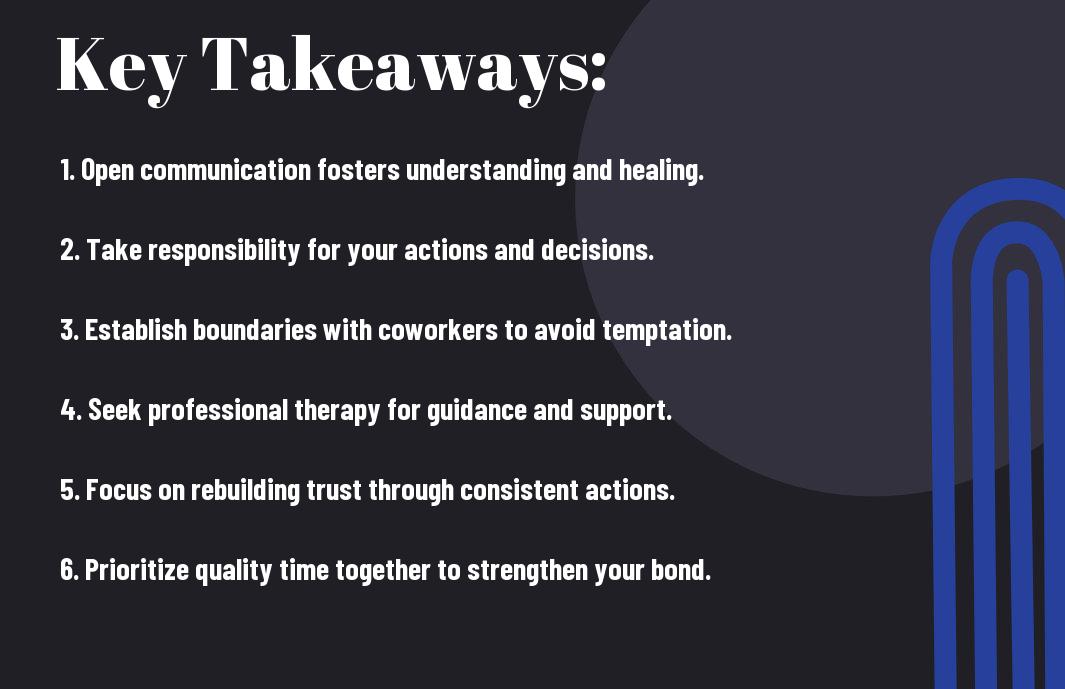Just encountering infidelity with a coworker can be devastating, but it doesn’t have to signal the end of your marriage. The road to healing is challenging, yet it offers a chance for growth and deeper connection. Start by acknowledging the betrayal and openly communicating with your partner about your feelings. Rebuilding trust takes time, so it’s crucial to prioritize honesty, therapy, and mutual support throughout this process. With commitment and effort, you can mend your marriage and emerge stronger than before.
Key Takeaways:
- Open and honest communication is crucial to address feelings of betrayal and understand each other’s perspectives.
- Establish boundaries and guidelines for interactions with the coworker to regain trust and restore safety in the relationship.
- Seek professional help, such as couples therapy, to facilitate healing and provide tools for rebuilding the marriage.
- Focus on reconnecting emotionally by spending quality time together and engaging in activities that reinforce your bond.
- Practice forgiveness, recognizing that it is a journey and may take time for both partners to fully heal.
- Reflect on the underlying issues that contributed to the infidelity to prevent similar situations in the future.
- Be patient with each other as you navigate through the healing process, allowing for growth and understanding.

Understanding Infidelity
A significant aspect of overcoming infidelity is understanding its complexities. It involves recognizing the emotional, psychological, and situational factors that contribute to the breach of trust in a relationship. By gaining insight into these aspects, you can navigate the challenges ahead, fostering healing and reconciliation within your marriage.
The Psychology Behind Cheating
Across various studies, psychological triggers ranging from seeking validation to escaping dissatisfaction in a relationship have been identified as common factors that lead individuals to cheat. Understanding these mentalities is important to addressing the underlying issues in your marriage and finding effective pathways to reconciliation.
Common Reasons for Infidelity in the Workplace
Understanding the landscape of workplace relationships can illuminate why infidelity often occurs in professional settings.
Hence, common reasons for infidelity in the workplace typically include factors like emotional connection with coworkers, proximity, and the opportunity for secretive meetings. Many individuals engage in affairs to seek validation that they might not feel at home. Additionally, workplace stress can create a sense of intimacy among colleagues, blurring boundaries and leading to overwhelming emotions. Recognizing these reasons can help you address vulnerabilities within your own marriage and foster healthier communication and connection.
Assessing the Impact on Your Marriage
There’s no denying that infidelity with a coworker can have a profound impact on your marriage. The realization that your partner has betrayed your trust may leave you feeling devastated, confused, and uncertain about the future of your relationship. In this pivotal moment, it’s necessary to take time to reflect on the emotional turmoil and the consequences it may bring, as understanding this impact is the first step toward healing.
Emotional Consequences
Between feelings of betrayal, anger, and sadness, both partners might find it challenging to process the emotional consequences of the affair. The pain can manifest as anxiety, depression, or even physical symptoms. Acknowledging these feelings is important as you work through the aftermath of the infidelity.
Trust Issues and Communication Breakdowns
An affair causes significant trust issues and often leads to communication breakdowns in your marriage. When trust is broken, it can feel impossible to re-establish the same level of openness and vulnerability you once shared. Conversations become strained, and you may struggle to express your feelings, leading to misunderstandings and heightened tensions. This may create an ongoing cycle of resentment and conflict that makes mending your marriage more difficult.
It’s necessary to acknowledge that trust issues require dedicated effort to rebuild. You and your partner need to engage in open and honest discussions about your feelings and concerns. Setting boundaries, being consistent, and actively listening can help restore the foundation of your relationship. Establishing a safe space for communication allows both of you to express your emotions without fear of judgment, paving the way for healing and a stronger bond as you work to move forward together.
Open Dialogue with Your Partner
To effectively address the issues stemming from infidelity, initiating an open dialogue with your partner is vital. This conversation allows both of you to express your feelings, concerns, and expectations moving forward. It’s important to approach this with empathy and honesty. For more tips on navigating emotional affairs, check out How To Get Over An Emotional Affair At Work.
Approaching the Conversation
Conversation should begin with a willingness to listen and an understanding that both of you may have complex emotions. Lead with honesty about your feelings while inviting your partner to share their perspective. Establishing a non-blaming tone can help ease tension and promote constructive dialogue.
Establishing a Safe Space for Discussion
Conversation is best held in a safe space where both you and your partner feel comfortable sharing. Ensuring this environment can significantly impact how openly you both communicate. Be sure to choose a time and place that is free from distractions. Additionally, practice active listening and validate each other’s feelings. Make it clear that judgment and blame are off the table to foster trust in the exchange. Prioritize emotional safety so that both partners feel secure enough to share vulnerable thoughts, leading to a deeper understanding and healing.
In addition, creating a safe space involves setting ground rules for the conversation. These can include agreeing to speak without interruptions, using “I” statements to express feelings, and allowing pauses to process emotions. Failing to establish these boundaries may lead to escalation and avoidance, hindering the healing process. By actively fostering a supportive environment, you not only encourage open communication but also pave the way for rebuilding intimacy and trust in your relationship.
Seeking Professional Help
Not addressing the emotional turmoil after infidelity can leave your marriage vulnerable to further damage. Seeking professional help from a qualified counselor can provide the support and guidance you both need. A therapist can facilitate communication, helping you and your partner navigate the complex feelings involved, fostering healing and understanding in your relationship.
Benefits of Marriage Counseling
Any couples willing to work on their relationship can greatly benefit from marriage counseling. This process provides a safe space for open dialogue, helping you both express feelings, rebuild trust, and cultivate new communication skills. With expert guidance, you can identify underlying issues, develop strategies for conflict resolution, and foster a deeper emotional connection.
Choosing the Right Therapist
To select the best therapist for your needs, consider their experience, specialization, and approach to couples therapy. You should also feel comfortable and supported, as a strong therapeutic alliance is vital for successful healing. Don’t hesitate to ask potential therapists about their methods and ensure they align with your goals for your marriage.
It’s important to research potential therapists thoroughly. Read reviews or ask for recommendations to find someone who specializes in infidelity recovery and has a proven track record in helping couples reconnect. A therapist should create a safe, non-judgmental environment, where both you and your partner feel empowered to share your thoughts and emotions openly. Finding the right fit can be transformative for your marriage, leading you toward a healthier, more resilient partnership.

Rebuilding Trust
All relationships can face challenges, but rebuilding trust after infidelity is imperative for healing. It requires open communication, patience, and a genuine commitment from both partners to restore the bond that was broken. You must create a safe space where feelings can be shared, and allow yourselves to navigate the complexities of trust together. This journey is not easy, but with dedication and honesty, you can move forward stronger than before.
Building Transparency
To foster a healthy environment, focus on transparency as a key component in rebuilding trust. You should openly share your thoughts and feelings, and encourage your partner to do the same. This exchange helps to dismantle barriers that may have contributed to the infidelity and lays the foundation for a more authentic and understanding relationship.
Setting New Boundaries
Below are suggested guidelines for establishing new boundaries in your relationship. Identify areas that need clarity and mutual agreement, such as communication with others and personal time. By setting these new limits, you both create a framework that helps to re-establish trust and aligns your expectations moving forward.
Understanding the importance of clear boundaries is imperative for your marriage’s future. Boundaries set a standard for behavior and inform both partners about what is acceptable and what isn’t. This openness prevents misunderstandings and reassures you of each other’s commitment to rebuilding trust. Consider discussing specific situations that concern you, such as interactions with colleagues or time spent outside the relationship. Setting these boundaries helps to eliminate opportunities for temptation and creates a space where both of you can feel secure and valued. Make sure to revisit these boundaries regularly and adjust them as needed to ensure they continue to reflect your evolving relationship.

Strengthening Your Relationship
Now is the time to focus on strengthening your relationship after experiencing infidelity. It’s imperative to rebuild trust and connection with your partner, fostering an environment where both of you feel secure and valued. By addressing underlying issues openly and committing to a shared path forward, you’ll not only heal the wounds but also create a stronger bond that can withstand future challenges.
Prioritizing Quality Time Together
Quality time is vital in rekindling the intimacy and connection between you and your partner. Make it a priority to schedule regular date nights or engaging activities, ensuring that you spend time truly focused on each other without distractions. This dedicated time allows for meaningful conversations and helps strengthen your emotional bond.
Engaging in Relationship-Building Activities
Relationship-building activities can significantly enhance the connection you share with your partner. These activities can range from hobbies you both enjoy to volunteering together, which fosters teamwork and cooperation. By engaging in such positive experiences, you create memories that can help counteract the negative ones from your past. This shared experience not only promotes healing but also cultivates a deeper sense of understanding and commitment between you. Focus on open dialogue and teamwork as you engage in these activities to build a stronger foundation for your future together.
Summing up
As a reminder, navigating infidelity with a coworker requires openness and dedication to rebuilding trust in your marriage. You must engage in honest conversations with your partner, addressing feelings and concerns while setting boundaries. Consider seeking professional help, like couples therapy, to facilitate healing and help you both understand the underlying issues that contributed to the infidelity. By focusing on communication, empathy, and commitment, you can work towards mending your relationship and emerging stronger together.
FAQ
Q: What signs should I look for if I suspect my partner is having an affair with a coworker?
A: It’s important to be observant of any changes in your partner’s behavior. Signs may include increased secrecy about phone calls or messages, unusual working hours, or a noticeable change in emotional availability. Additionally, if your partner is suddenly paying more attention to their appearance or is emotionally distant, these could be indicators that something is amiss. However, it’s vital to communicate openly rather than jump to conclusions based on suspicion alone.
Q: How can I address the issue of infidelity with my spouse?
A: Open communication is key when addressing infidelity. Approach your partner in a calm and non-confrontational manner. Express your feelings and concerns without being accusatory. It may be helpful to set aside time for a private conversation where both of you can share your perspectives. Consider using “I” statements to express how their actions have affected you, which can lead to a more productive dialogue.
Q: Is it possible to rebuild trust after an affair?
A: Yes, rebuilding trust is challenging but achievable, given both partners are committed to the process. It typically involves transparency, setting boundaries, and potentially seeking professional help through counseling. The unfaithful partner must show accountability and willingness to make amends, while the other partner should be open to discussing their feelings and slowly working through the hurt. Trust takes time to restore, so patience and understanding are vital.
Q: Should we consider couples therapy after infidelity?
A: Couples therapy can be highly beneficial after an affair. A trained therapist can help facilitate communication, guide both partners through their emotions, and assist in identifying underlying issues that may have contributed to the infidelity. Therapy provides a safe space for both individuals to express their thoughts and feelings while working towards rebuilding their relationship. It’s important to find a therapist experienced in dealing with infidelity to ensure focused support.
Q: How do I move forward if I choose to stay in the marriage?
A: If you decide to stay in the marriage, it’s vital to establish a path for healing. This process may involve setting new boundaries, rediscovering trust, and prioritizing quality time together. Communicate openly about your needs and feelings, and work together to rebuild the emotional connection. Engaging in activities you both enjoy or seeking recommitment rituals can help strengthen your bond. Also, consider engaging in support groups or counseling to navigate the complexities of your feelings moving forward.
